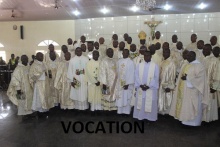We have commenced our Lenten season amidst the trials and tribulations that have come to characterise our elections. Elsewhere, elections are a routine processes by which citizens affirm or withdraw the mandates given to those they have elected or offer mandates to new aspirants and seekers who wish to govern them. As always, the idea is to give power to the ordinary citizen to decide who governs him/her. However, for us in Nigeria, this simple, routine process has turned into a minor war, claiming innocent lives and leaving hundreds of citizens physically and emotionally wounded.
Either way, the Presidential and National Assembly elections have come and gone. Next are the second sets of elections which will again throw new challenges to us as we elect our Governors and State Legislators. However, I appeal to us all to remain calm and prayerful by dedicating and entrusting the future into God’s hands. The elections will come and go. We as citizens would have done our duty. Going forward, we must ensure that we do not leave the future entirely in the hands of the political class. We must continue to engage them to ensure that the quality of the lives of our people improves significantly.
Very often, when we think of Lent, our minds go immediately to the List of Don’ts. We think about abstinence and other forms of penance and self-denial. However, Lent means more than that. It offers all Christians an opportunity to pause and reflect on the totality of our lives, the mistakes and the failures, the triumphs and all the good news we have had to celebrate. All in all, Lent will only be meaningful if we tie everything to the larger mission of Jesus Christ who said that He came so that we may have life and have it to the full (Jn.10: 10). We also recall the assurance that He has gone to prepare a place for us, so that where He is, we shall be also (Jn. 14:3). It is these thoughts that should give us consolation as we contemplate the future and Easter (1 Thess. 4:18).
In his first Encyclical, titled, The Joy of the Gospel, (2013), Pope Francis drew the attention of all Christians to the fact that Joy is at the centre of the mission of Christ and that to be a Christian is to be a carrier of Joy. Thus, the Holy Father reminded Christians to beware of the evil one who comes like a thief in the night, primarily to kill and destroy (Jn.10.10). He appealed to Christians not to allow themselves to be robbed of Five categories of Joy: the Joy of evangelisation, the Joy of hope, the Joy of community, the Joy of fraternal love and finally, the Joy of missionary vigour. The period of Lent calls upon us to ask the meaning of being a Christian.
Lent further gives us a chance to ask a few questions: Is there joy in my life? If yes, where or from whom do I derive that joy? How much do I contribute to the joy of other people around me? If I am sad, what causes my sorrow? These simple questions can only be answered by each of us because often, Joy and sorrow are very personal and they occur at the inner depth of our beings. Nothing material can offer us joy. Real Joy can only come from the one who knows the depths of our beings, the one who is Himself the source of Joy. This is why, we have to fall back on those timeless words of St. Augustine who said that our hearts will forever remain restless until they rest in God.
Lent is a time to examine the state of our interior castles. This means we have to find space and time to be alone with God, to listen to His voice and inner promptings through His spirit. We live in a very noisy society and our God is not a God of noise. The encounter between Elijah and God testifies to that. When God invited him, God’s voice was neither in the strong breeze nor the earthquake, but in the gentle breeze (1 Kgs. 10:13ff). So, each of us must try and find time to be alone with God. It is wonderful to be with Jesus in the Blessed Sacrament, but even a little space in your house or room can be good enough place to meet Jesus during this season.
Finally, Lent is marked by three key virtues which the Church encourages us to take to heart: Prayer, Fasting and Alms giving. Very often, we think that Prayer is something that can be taught to us by experts. Anyone who is able to communicate, no matter age or status, can pray. It is not the words or logic that matter. There are no prayer experts lurking around to be hired by us.
Prayer is communicating, often from the pit of our being to God. When Hannah prayed for a child, she was full of anguish and cried bitterly. Even Eli the priest accused her of being drunk and asked her, must you come here drunk? (1 Sam.1: 10, 14). In the temple, while the righteous Pharisee thrived in listing out his good deeds and all the bad things he had avoided, the Publican simply beat his breast and said to God: Be merciful to me a sinner! (Lk. 18: 10, 13). So, often, in the end, what we do in Lent is more important than what we avoid.
Pope Francis has listed a few simple things that all of us can connect with during this Lenten season. You will be surprise how easy they are. Here are some of them: Smile, Thank you, Greetings, Offer to help, Make a call. Again, while encouraging us to Fast, the Holy Father proposes avoiding; Negativity, Anger, Fury, Pessimism, Worries, Complaints, Selfishness, Lack of forgiveness etc. Whatever may be the case, please, undertake something that will change your life. Take this Lent seriously and expand your notion of fasting.
None of us is too poor to give, nor should we be too tired of giving. Giving is not tied to money alone. Let us not tire of the various little acts of kindness some of which the Holy Father has enunciated. I invite all of us, Priests and Religious especially, to show our people the way. Take notice of the environment around which we live. See how the Muslims take their Fasting seriously. We cannot do less as we approach the throne of God’s mercy. May His mercy accompany us all in this holy season.
Most Rev Dr Matthew Hassan Kukah
Bishop of sokoto


